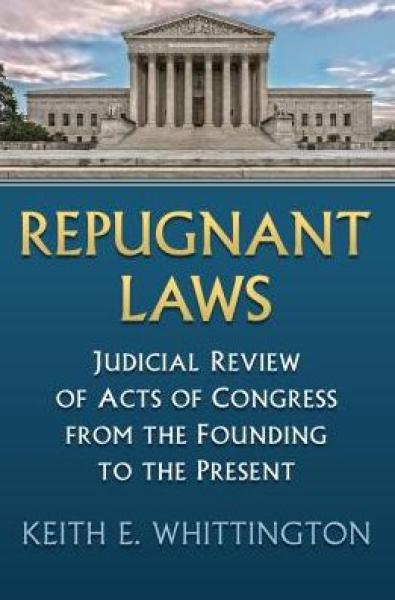Description
A thorough examination of the record of judicial review requires first a comprehensive inventory of relevant cases. To this end, Whittington revises the extant catalog of cases in which the court has struck down a federal statute and adds to this, for the first time, a complete catalog of cases upholding laws of Congress against constitutional challenges. With reference to this inventory, Whittington is then able to offer a reassessment of the prevalence of judicial review, an account of how the power of judicial review has evolved over time, and a persuasive challenge to the idea of an antidemocratic, heroic court. In this analysis, it becomes apparent that that the court is political and often partisan, operating as a political ally to dominant political coalitions; vulnerable and largely unable to sustain consistent opposition to the policy priorities of empowered political majorities; and quasi-independent, actively exercising the power of judicial review to pursue the justices' own priorities within bounds of what is politically tolerable.
The court, Repugnant Laws suggests, is a political institution operating in a political environment to advance controversial principles, often with the aid of political leaders who sometimes encourage and generally tolerate the judicial nullification of federal laws because it serves their own interests to do so. In the midst of heated battles over partisan and activist Supreme Court justices, Keith Whittington's work reminds us that, for better or for worse, the court reflects the politics of its time.
The USA may want to believe that the Supreme Court is above politics; in fact the Court is a political institution and operates in a political environment to advance controversial principles, often with the aid of political leaders who sometimes encourage and generally tolerate the judicial nullification of federal laws because it serves their own interests to do so.
Keith E. Whittington is William Nelson Cromwell Professor of Politics at Princeton University. His many books include Political Foundations of Judicial Supremacy, Speak Freely, and, also from Kansas, Constitutional Interpretation.
An impressive piece of scholarship that provides a comprehensive account of how the Supreme Court has used judicial review for multiple purposes, not merely check congressional power but also to constitute it.--Political Science Quarterly
Repugnant Laws is a groundbreaking work, and the data on which it is based will prove invaluable to scholars of judicial politics. Whittington also deserves much credit for pointing the way toward a more nuanced understanding of the Supreme Court's relationship to political parties and electoral coalitions.--Constitutional Commentary
Readers will get a strong sense of the key issues on which judicial review turned across the eras of U.S. political history, as well as the policy goals and political conflicts that animated Congress in the first place.--Journal of Interdisciplinary History
Repugnant Laws stands as a helpful corrective to the partisan narratives of both sides--and is sure to set the standard for books of its kind for decades to come.--The American Interest
An impressively thorough, empirical study of judicial review, from the founding to the Supreme Court's 2017 term. The book makes for rewarding reading.--Claremont Review of Books
Whittington here offers a thorough rejoinder to the often-repeated notion that the Supreme Court's exercise of judicial review is counter majoritarian. He also offers novel and thought-provoking analyses of famous cases, placing them in new light. There may be no better time to seek a fuller understanding of how judicial independence (whether in the form of activism or otherwise) can arise in different forms. Whittington's book is sure to inform those discussions. Highly recommended.--Choice
As contemporary judicial selection politics amplify the urgency of discussions regarding judicial activism, the Court's legitimacy, and the relationship between party and judicial office, Whittington's study reminds readers that the Supreme Court has long acted as a nation-builder and an arm of the national state, operating within partisan politics. In stressing 'the conditional quality of judicial independence, ' Whittington offers the counsel of perspective on our current era of partisan polarization and strained inter-branch relations.--Nancy Maveety, author of Queen's Court: Judicial Power in the Rehnquist Era
Keith Whittington's invaluable and comprehensive survey of Supreme Court decisions striking down&#mdash;and upholding--federal statutes carefully maps the complex relations between the Court and the political coalitions that produce, support, or sometimes abandon the laws the Court reviews. Bringing insights from American political development to bear, Whittington has supplanted Robert Dahl's classic work while preserving its core. Everyone interested in American political development and the Supreme Court must now take this work into account.--Mark Tushnet, William Nelson Cromwell Professor of Law, Harvard Law School
Any book by Keith Whittington is an important book, and this one is no exception. Facts matter and this book provides them. From now on, no discussion of the practice of judicial review can ignore its empirical findings. The most cynical political scientist will need to come to grips with its conclusion that 'the justices are not lapdogs, and they have often bitten the hand of the party that put them on the bench.' At the same time, idealists will need to incorporate its findings that the 'justices have proven themselves to be allies of [their] political coalition leaders.' Simply a must-read for any serious student of our Constitution and how it actually works.--Randy E. Barnett, director of the Georgetown Center for the Constitution; author of Our Republican Constitution: Securing the Liberty and Sovereignty of We the People
Product Details
- University Press of Kansa Brand
- May 15, 2019 Pub Date:
- 0700627790 ISBN-10:
- 9780700627790 ISBN-13:
- 432 Pages
- 9.3 in * 6.4 in * 1.4 in Dimensions:
- 2 lb Weight:




